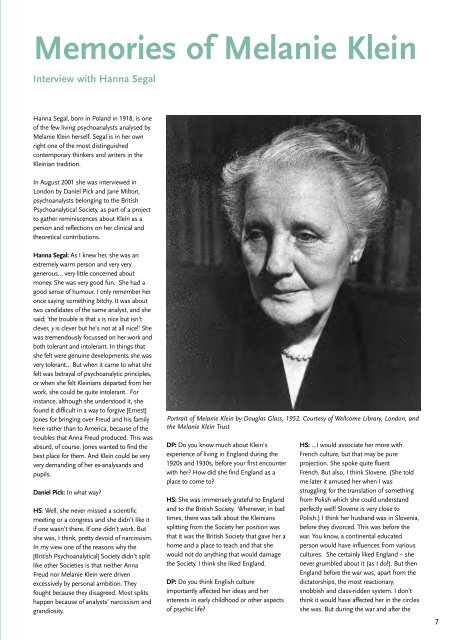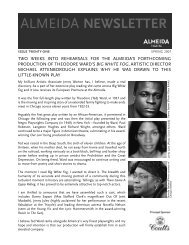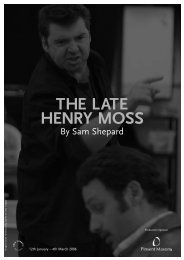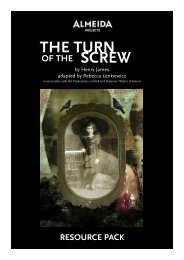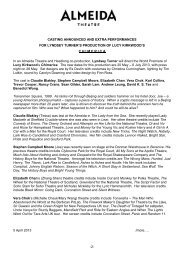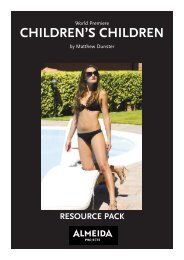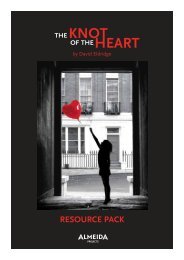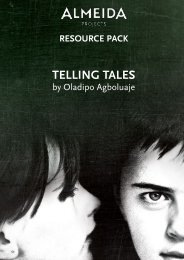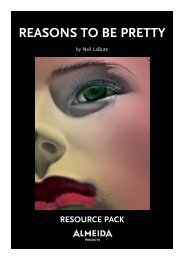MRS KLEIN - Almeida Theatre
MRS KLEIN - Almeida Theatre
MRS KLEIN - Almeida Theatre
You also want an ePaper? Increase the reach of your titles
YUMPU automatically turns print PDFs into web optimized ePapers that Google loves.
Memories of Melanie Klein<br />
Interview with Hanna Segal<br />
Hanna Segal, born in Poland in 1918, is one<br />
of the few living psychoanalysts analysed by<br />
Melanie Klein herself. Segal is in her own<br />
right one of the most distinguished<br />
contemporary thinkers and writers in the<br />
Kleinian tradition.<br />
In August 2001 she was interviewed in<br />
London by Daniel Pick and Jane Milton,<br />
psychoanalysts belonging to the British<br />
Psychoanalytical Society, as part of a project<br />
to gather reminiscences about Klein as a<br />
person and reflections on her clinical and<br />
theoretical contributions.<br />
Hanna Segal: As I knew her, she was an<br />
extremely warm person and very very<br />
generous… very little concerned about<br />
money. She was very good fun. She had a<br />
good sense of humour. I only remember her<br />
once saying something bitchy. It was about<br />
two candidates of the same analyst, and she<br />
said; ‘the trouble is that x is nice but isn’t<br />
clever, y is clever but he’s not at all nice!’ She<br />
was tremendously focussed on her work and<br />
both tolerant and intolerant. In things that<br />
she felt were genuine developments she was<br />
very tolerant… But when it came to what she<br />
felt was betrayal of psychoanalytic principles,<br />
or when she felt Kleinians departed from her<br />
work, she could be quite intolerant. For<br />
instance, although she understood it, she<br />
found it difficult in a way to forgive [Ernest]<br />
Jones for bringing over Freud and his family<br />
here rather than to America, because of the<br />
troubles that Anna Freud produced. This was<br />
absurd, of course. Jones wanted to find the<br />
best place for them. And Klein could be very<br />
very demanding of her ex-analysands and<br />
pupils.<br />
Daniel Pick: In what way?<br />
HS: Well, she never missed a scientific<br />
meeting or a congress and she didn’t like it<br />
if one wasn’t there. If one didn’t work. But<br />
she was, I think, pretty devoid of narcissism.<br />
In my view one of the reasons why the<br />
[British Psychoanalytical] Society didn’t split<br />
like other Societies is that neither Anna<br />
Freud nor Melanie Klein were driven<br />
excessively by personal ambition. They<br />
fought because they disagreed. Most splits<br />
happen because of analysts’ narcissism and<br />
grandiosity.<br />
Portrait of Melanie Klein by Douglas Glass, 1952. Courtesy of Wellcome Library, London, and<br />
the Melanie Klein Trust<br />
DP: Do you know much about Klein’s<br />
experience of living in England during the<br />
1920s and 1930s, before your first encounter<br />
with her? How did she find England as a<br />
place to come to?<br />
HS: She was immensely grateful to England<br />
and to the British Society. Whenever, in bad<br />
times, there was talk about the Kleinians<br />
splitting from the Society her position was<br />
that it was the British Society that gave her a<br />
home and a place to teach and that she<br />
would not do anything that would damage<br />
the Society. I think she liked England.<br />
DP: Do you think English culture<br />
importantly affected her ideas and her<br />
interests in early childhood or other aspects<br />
of psychic life?<br />
HS: …I would associate her more with<br />
French culture, but that may be pure<br />
projection. She spoke quite fluent<br />
French. But also, I think Slovene. (She told<br />
me later it amused her when I was<br />
struggling for the translation of something<br />
from Polish which she could understand<br />
perfectly well! Slovene is very close to<br />
Polish.) I think her husband was in Slovenia,<br />
before they divorced. This was before the<br />
war. You know, a continental educated<br />
person would have influences from various<br />
cultures. She certainly liked England – she<br />
never grumbled about it (as I do!). But then<br />
England before the war was, apart from the<br />
dictatorships, the most reactionary,<br />
snobbish and class-ridden system. I don’t<br />
think it would have affected her in the circles<br />
she was. But during the war and after the<br />
7


